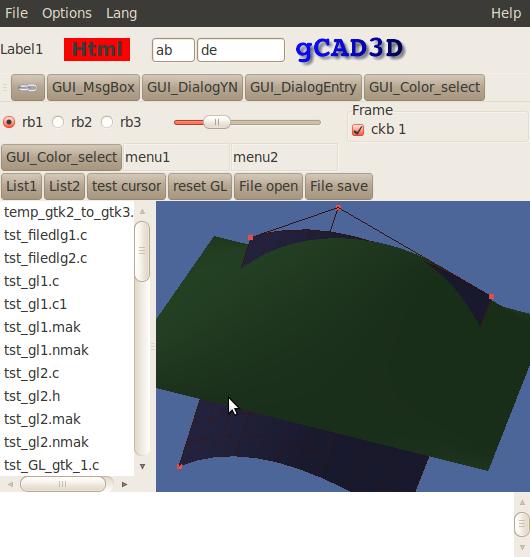
GTK and GNOME chose to implement Unicode using UTF-8, and that's what is wrapped by Glib::ustring. The C and C++ languages do not yet provide any standardised Unicode support for UTF-8 encoding. Std::string uses 8 bits per character, but 8 bits aren't enough to encode languages such as Arabic, Chinese, and Japanese.Īlthough the encodings for these languages have been specified by the Unicode Consortium, But read on if you want to use languages other than English in your application. Instead it uses Glib::ustring, which is so similar and unobtrusive that you could actually pretend that each Glib::ustring is a std::string and ignore the rest of this section. You might be surprised to learn that gtkmm doesn't use std::string in its interfaces. Learn more about gtkmm memory management techniques in the When the parent container (which may itself be managed) is deleted. To the container and not be concerned about deleting it, since that will occur This allows you to create the widget, add it The Gtk::make_managed()Īllows you to create a new widget and state that it will become owned by theĬontainer into which you place it. Those of other C++ classes, gtkmm has an optional time-saving feature that you See the Glade and Gtk::Builder chapter.Īlthough gtkmm widget instances have lifetimes and scopes just like
#Gtk programming windows#
See the Container Widgets section for more details about adding widgets to container widgets.Īlthough you can specify the layout and appearance of windows and widgets with C++ code, you will probably find it more convenient to design your user interfaces with Glade and load them at runtime with Gtk::Builder. Most of the chapters in this book deal with specific widgets. It's easier to start with a Makefile similar to the Makefile.example files If you start by experimenting with a small application that you plan to use just for yourself, The GNU site has more information about autoconf Note that if you mention extra modules in addition to gtkmm-4.0, they should be separated by spaces, not commas.

With gtkmm-4.0 without affecting existing applications.
#Gtk programming install#
There might be a future gtkmm-5.0 API which would install in parallel Note that the API name does not change for every version because that would be an incompatibleĪPI and ABI break. Versions of gtkmm-2.4, such as gtkmm 2.10 and there are several versions of the gtkmm-3.0 API. There are older APIs called gtkmm-2.4Īnd gtkmm-3.0 which install in parallel when they are available. Gtkmm-4.0 is the name of the current stable API. This checks for the presence of gtkmm and defines MYAPP_LIBS and MYAPP_CFLAGS for use in your Makefile.am files. However, this is even simpler when using the PKG_CHECK_MODULES() macro in a standard configure.ac file with autoconf and automake. Try running it from your shell-prompt to see the results on your system. List of libraries for the compiler to link with and the directories toįind them in. Pkg-config to output a list of include directories for theĬompiler to look in the -libs option requests the Program 'knows' what compiler switches are needed to compile programs Is present in all (properly installed) gtkmm installations. To simplify compilation, we use pkg-config, which You'll just need to find the appropriate directory and type make. The examples used in this book are included in the gtkmm-documentation package, with appropriate build files, so we won't show the build commands in future.
#Gtk programming code#
Gtkmm involves less code compared to GTK, which uses prefixed function names and lots of cast macros.Īlthough we have shown the compilation command for the simple example, you really should use the automake and autoconf tools, as described in "Autoconf, Automake, Libtool", by G.


As a C++ coder you know that pointers should be avoided where possible. All GTK C widgets are dealt with by use of pointers. Member instances can be used, simplifying memory management. As a C++ developer you know that derivation is an essential Object Orientated technique. The derivation of new widgets in GTK C code is so complicated and error prone that almost no C coders do it. Inheritance can be used to derive new widgets. This use of specific types also makes the API clearer because you can see what types should be used just by looking at a method's declaration. Gtkmm is more type-safe, so the compiler can detect errors that would only be detected at run time when using C. As a C++ programmer you probably already realise that this leads to clearer and better organized code. Gtkmm allows you to write code using normal C++ techniques such as encapsulation, derivation, and polymorphism.


 0 kommentar(er)
0 kommentar(er)
